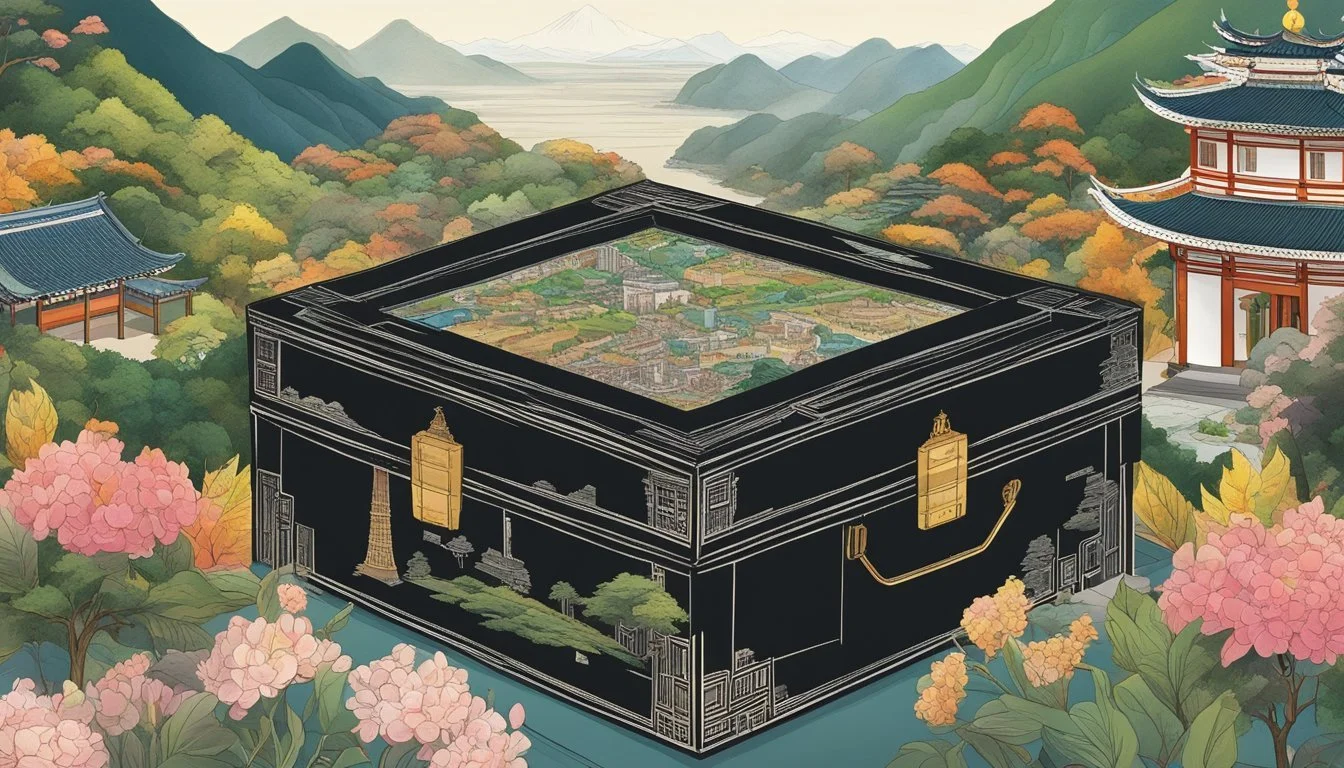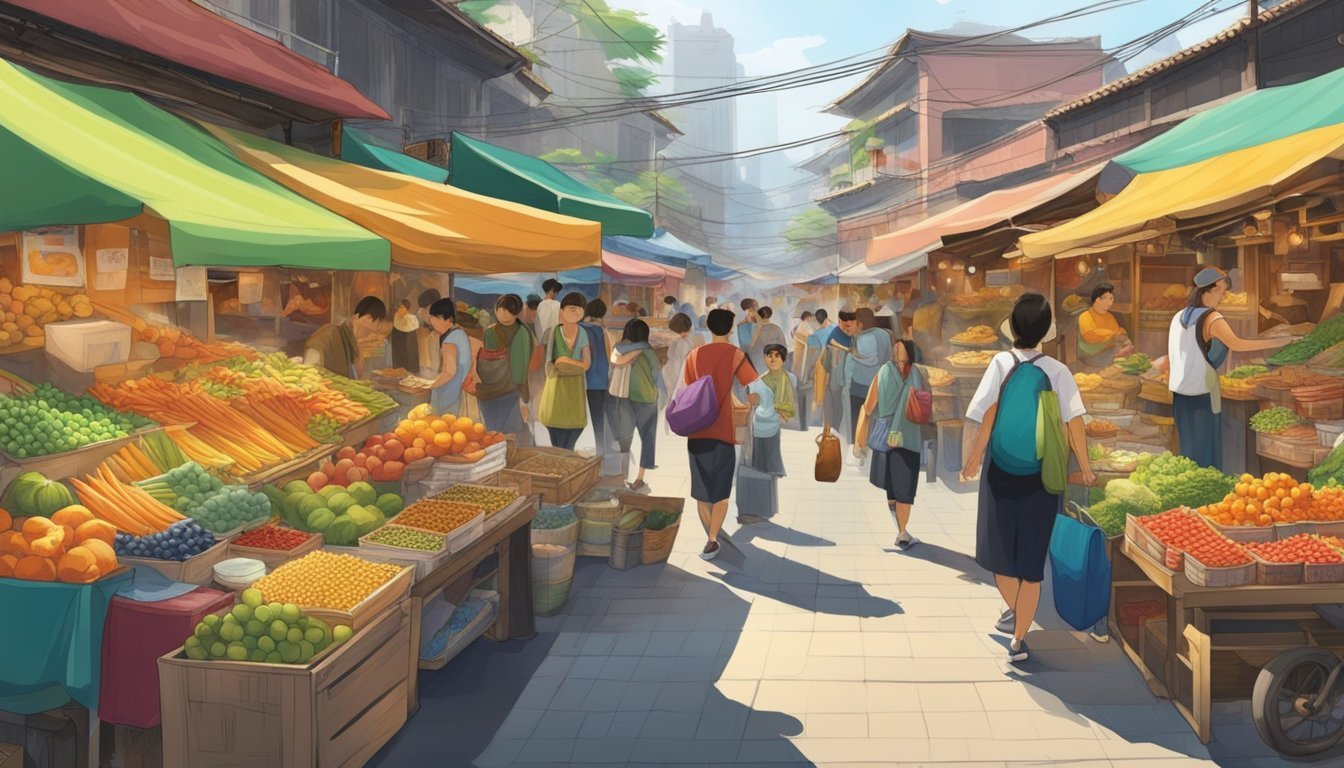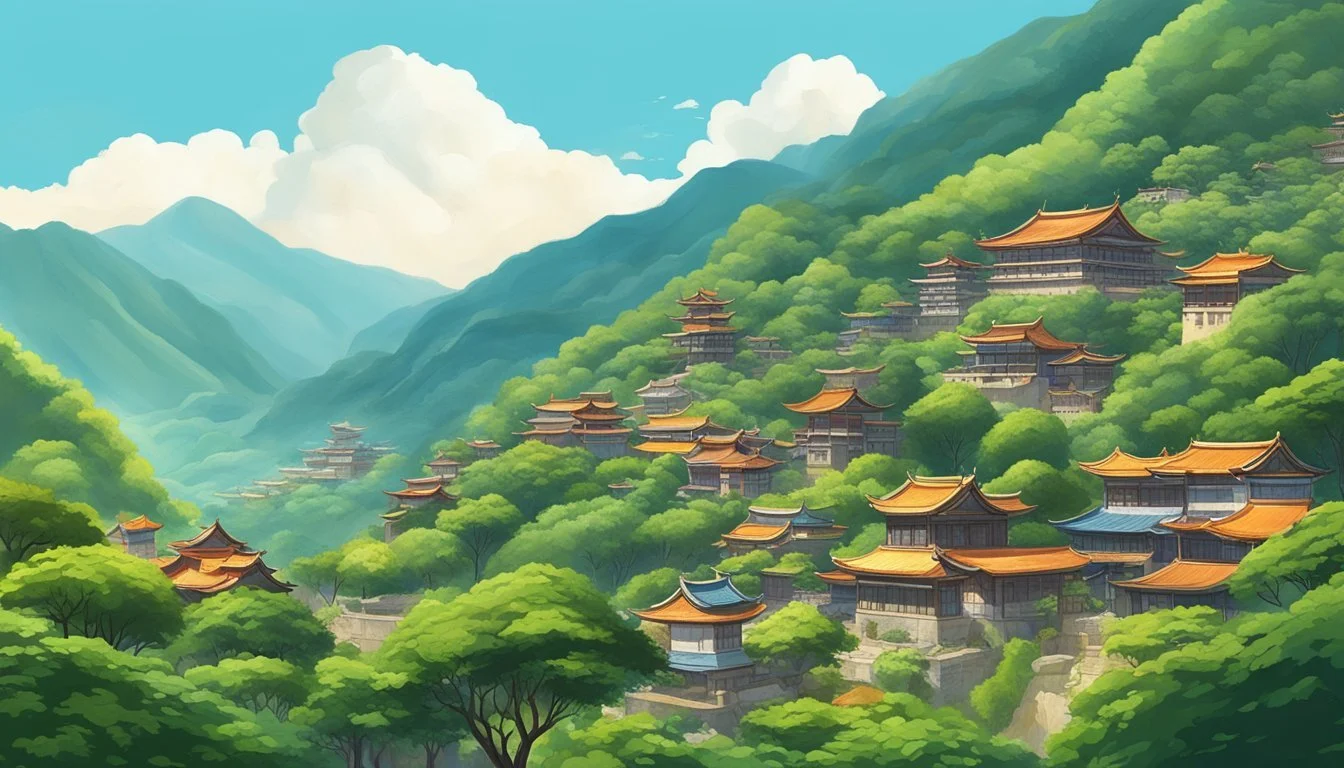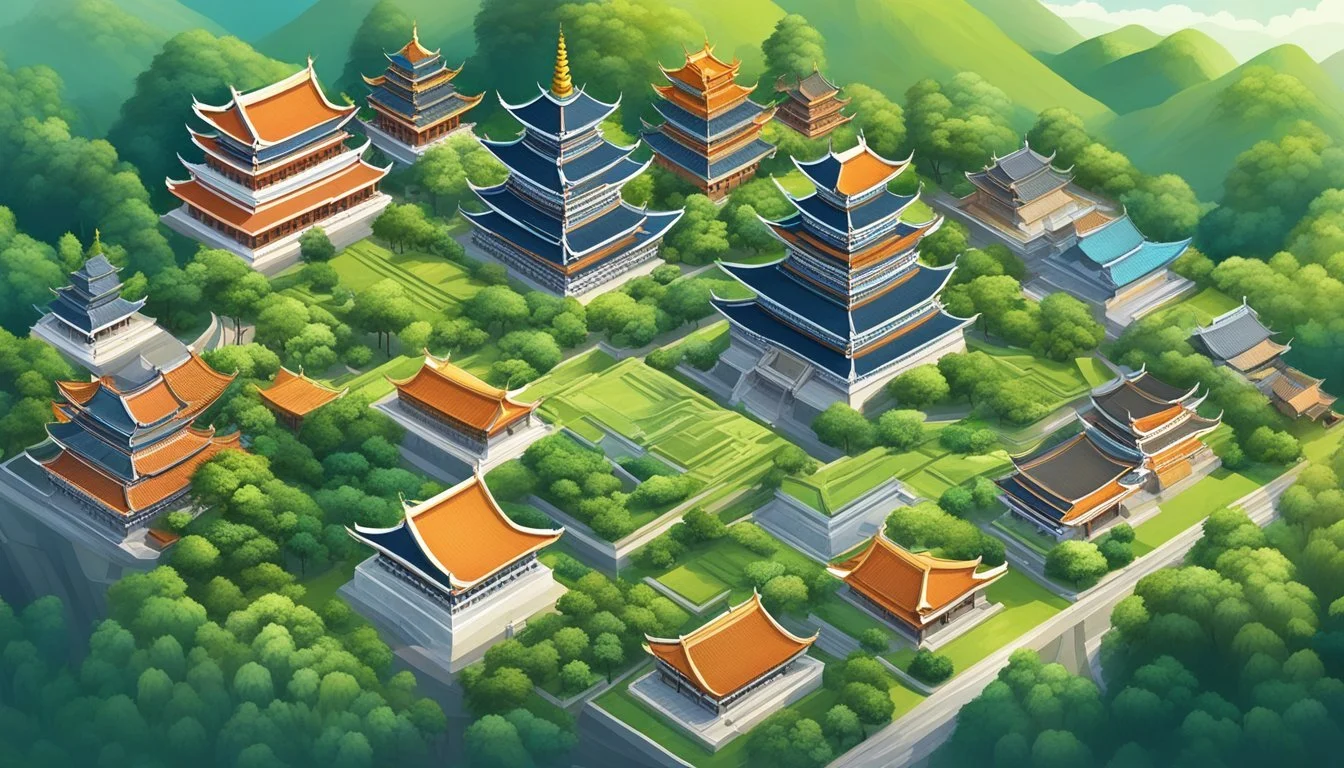10 Thought-Provoking Documentaries About Taiwan
Exploring the Island's Complex History and Culture
Taiwan's rich history, complex political situation, and vibrant culture make it a fascinating subject for documentary filmmakers. From its natural beauty to its geopolitical significance, the island nation offers a wealth of compelling stories waiting to be told.
These documentaries provide viewers with unique insights into Taiwan's struggle for international recognition, its relationship with China, and the daily lives of its people. They showcase the country's resilience, innovation, and democratic values while exploring the challenges it faces on the global stage. Through a mix of personal narratives and expert analysis, these films offer a nuanced understanding of Taiwan's past, present, and potential future.
1) "Our Youth in Taiwan" by Fu Yue
"Our Youth in Taiwan" is a 2018 documentary directed by Fu Yue. The film focuses on two prominent figures from the Taiwanese Sunflower Student Movement of 2014: Wei-Ting Chen and Boyi Cai.
Fu Yue's documentary spans from 2011 to 2017, capturing the evolution of youth activism in Taiwan. It explores the idealism and challenges faced by young adults involved in social movements.
The film provides an intimate look at the lives of its subjects, showcasing their emotions, hard work, and reflections. It delves into the complexities of political engagement and the personal growth that comes with it.
"Our Youth in Taiwan" offers insights into the relationship between documentary filmmaking and social activism. It examines how young people navigate their roles in shaping Taiwan's future.
The documentary received critical acclaim for its portrayal of youth-led social movements in Taiwan. It offers a nuanced perspective on the hopes, struggles, and transformations of young activists during a pivotal time in Taiwan's recent history.
2) "Beyond Beauty: Taiwan From Above" by Chi Po-lin
"Beyond Beauty: Taiwan From Above" is a visually stunning documentary directed by Chi Po-lin in 2013. The film offers a unique aerial perspective of Taiwan's diverse landscapes and environmental challenges.
Chi Po-lin, a former aerial photographer, captured over 600,000 images during the making of this documentary. His work showcases Taiwan's natural beauty from mountaintops to coastlines.
The film became Taiwan's highest-grossing documentary, raising awareness about environmental issues facing the island. It prompted discussions on conservation and sustainable development among viewers.
Premier Jiang Yi-huah praised Chi's dedication to the project and encouraged youth to protect the environment after watching the film. The documentary's impact extended beyond entertainment, inspiring environmental stewardship.
Chi Po-lin's work continues to influence Taiwan's environmental consciousness. The Chi Po-lin Foundation now carries on his legacy, promoting awareness through visual storytelling and educational initiatives.
3) "The Black Box" by Wu Mi-sen
"The Black Box" is a compelling documentary that explores Taiwan's complex political landscape. Directed by Wu Mi-sen, the film delves into the intricacies of Taiwan's government and decision-making processes.
Wu's documentary sheds light on the often opaque workings of Taiwan's political system. It examines the power dynamics between different factions and institutions within the government.
The film features interviews with key political figures, analysts, and citizens. These diverse perspectives offer viewers a nuanced understanding of Taiwan's political realities.
"The Black Box" also touches on Taiwan's relationship with China and the United States. It explores how these international relationships influence domestic politics and policy-making.
Wu's documentary style is observational and impartial. He presents multiple viewpoints without overtly favoring any particular stance, allowing viewers to form their own conclusions.
The film has garnered critical acclaim for its in-depth analysis and balanced approach. It provides valuable insights into Taiwan's political system for both local and international audiences.
4) "Small Talk" by Huang Hui-chen
"Small Talk" is a deeply personal documentary directed by Taiwanese filmmaker Huang Hui-chen. The film explores the complex relationship between Huang and her mother, Anu, who is a lesbian.
Through intimate conversations, Huang attempts to understand her mother's experiences and identity. The documentary touches on sensitive topics such as domestic abuse, mental health, and LGBTQ issues in Taiwan.
Huang's film gained international recognition, winning the Teddy Award at the 67th Berlin International Film Festival. This accolade highlights the documentary's significant contribution to LGBTQ cinema.
"Small Talk" offers a rare glimpse into the life of an older Taiwanese lesbian. It provides valuable insights into the challenges faced by LGBTQ individuals in Taiwan's society.
The documentary's honest approach to family dynamics and personal struggles resonates with audiences. It sheds light on the complexities of mother-daughter relationships and the impact of cultural norms on individual lives.
5) "The Gift of Life" by Zhuang Yung-hsu
"The Gift of Life" is a poignant documentary directed by Taiwanese filmmaker Zhuang Yung-hsu. The film explores the complex issue of organ donation in Taiwan.
Zhuang's camera follows several individuals and families as they navigate the emotional and ethical challenges surrounding organ transplantation. The documentary presents intimate portraits of patients awaiting life-saving organs and donors' families grappling with difficult decisions.
Through personal stories and expert interviews, the film sheds light on Taiwan's organ donation system and cultural attitudes toward the practice. It examines how Buddhist beliefs about death and the afterlife influence decisions about organ donation.
"The Gift of Life" also highlights efforts to raise awareness and increase donation rates in Taiwan. The documentary captures candid discussions between medical professionals, policymakers, and the public about this sensitive topic.
Zhuang's thoughtful approach avoids sensationalism while still conveying the urgency of the organ shortage. The film encourages viewers to consider their own stance on organ donation and spark conversations about this important public health issue.
6) "A Morning in Taipei" by Wang Shaudi
Wang Shaudi's documentary "A Morning in Taipei" offers a intimate glimpse into the daily life of Taiwan's capital city. The film captures the vibrant energy of Taipei as it awakens, showcasing the diverse routines of its residents.
Viewers follow various individuals as they start their day, from street vendors preparing their stalls to office workers commuting on the efficient metro system. The documentary highlights the blend of traditional and modern elements that define Taipei's urban landscape.
Wang's camera expertly weaves through bustling morning markets, serene parks, and iconic landmarks like Taipei 101. The film captures the city's unique character, from its renowned street food culture to its efficient public transportation.
Through its focus on ordinary citizens, "A Morning in Taipei" reveals the warmth and industriousness of the Taiwanese people. The documentary provides insight into the cultural values and social dynamics that shape life in this dynamic metropolis.
Wang Shaudi's observational style allows viewers to experience Taipei's morning rhythm firsthand, offering a nuanced portrait of the city's daily awakening. The film serves as both a cultural document and a visually engaging exploration of urban life in Taiwan.
7) "Let It Be" by Yen Lan-chuan and Juang Yi-tseng
"Let It Be" is a compelling documentary that sheds light on the struggles of rice farmers in Taiwan. Released in 2005, the film offers an intimate look at the lives of aging farmers facing economic hardships.
Yen Lan-chuan and Juang Yi-tseng skillfully capture the resilience of these farmers as they confront challenging market conditions and declining profitability. The documentary portrays their deep connection to the land and traditional farming practices.
Through candid interviews and observational footage, the filmmakers reveal the farmers' dedication to their craft despite mounting financial pressures. The film highlights the broader issues affecting Taiwan's agricultural sector and rural communities.
"Let It Be" garnered critical acclaim for its sensitive portrayal of a vanishing way of life. It raised awareness about the plight of small-scale farmers in a rapidly modernizing economy.
The documentary's title reflects the farmers' stoic acceptance of their circumstances, even as they continue to work their fields. It serves as a poignant tribute to their perseverance and cultural heritage.
8) "Bridge Over Troubled Water" by Yang Li-chou
"Bridge Over Troubled Water" is a documentary directed by Yang Li-chou that explores the complex relationship between Taiwan and China. The film takes its name from the iconic Simon & Garfunkel song, using it as a metaphor for the tensions across the Taiwan Strait.
Yang's documentary examines the historical, political, and cultural factors that have shaped Taiwan's identity and its relationship with mainland China. It features interviews with people from various backgrounds, including politicians, scholars, and ordinary citizens.
The film delves into the concept of Taiwanese identity and how it has evolved over time. It highlights the challenges faced by Taiwan in maintaining its de facto independence while navigating diplomatic pressures from China.
Yang Li-chou's work provides a nuanced look at the Taiwan-China situation, avoiding simplistic narratives. The documentary presents multiple perspectives, allowing viewers to gain a deeper understanding of the complex issues at play.
"Bridge Over Troubled Water" offers insights into Taiwan's democratic system and its efforts to maintain autonomy. It also explores the economic ties between Taiwan and China, and their impact on cross-strait relations.
9) "The Last Aristocrats" by Ho Chao-ti
"The Last Aristocrats" is a documentary that explores the lives of Taiwan's elite families during a period of significant social and political change. Directed by Ho Chao-ti, the film provides a glimpse into the world of Taiwan's aristocratic class.
The documentary focuses on several prominent families, including that of writer Pai Hsien-yung. Pai, often referred to as one of "the last aristocrats" from China, is known for his literary works that depict the fading world of the upper class.
Ho Chao-ti's film captures the challenges faced by these families as they navigate Taiwan's evolving social landscape. It examines how they maintain their traditions and identity in a rapidly modernizing society.
The documentary offers a unique perspective on Taiwan's history, blending personal stories with broader societal shifts. It sheds light on the complex relationships between class, culture, and national identity in Taiwan.
Through intimate interviews and archival footage, "The Last Aristocrats" provides viewers with a rare look into a world that is slowly disappearing. It serves as both a historical record and a thought-provoking exploration of social change in Taiwan.
10) "Voices of Orchid Island" by Ke Chin-yuan
"Voices of Orchid Island" is a compelling documentary released in 1993. It offers a unique glimpse into the lives of the indigenous Tao people on Orchid Island, located off Taiwan's southeastern coast.
The film captures the cultural traditions and daily routines of the Tao community. It showcases their distinctive boat-building techniques, fishing practices, and traditional ceremonies.
Ke Chin-yuan's work highlights the challenges faced by the Tao people. These include the impact of modernization and the presence of a nuclear waste storage facility on their small island.
The documentary gives voice to the islanders' concerns about environmental issues and cultural preservation. It presents their struggles to maintain their way of life in the face of external pressures.
Through intimate interviews and observational footage, the film provides a rare window into this often-overlooked indigenous community. It brings attention to their rich cultural heritage and the threats to their traditional lifestyle.
"Voices of Orchid Island" serves as an important historical record. It documents a critical period in the Tao people's history and their efforts to preserve their unique culture.
Cultural Insights and Influences
Taiwanese documentaries offer a window into the island's rich cultural tapestry, exploring historical roots and contemporary society. These films capture the essence of Taiwan's unique identity, shaped by diverse influences and ongoing social changes.
Historical Context
Taiwan's complex history is reflected in its documentary films. Many explore the island's aboriginal heritage, dating back thousands of years. The impact of Chinese immigration waves, Japanese colonial rule, and Kuomintang governance features prominently. Documentaries often highlight the cultural fusion resulting from these influences, showcasing traditional festivals, rituals, and arts that blend various traditions.
Some films focus on pivotal moments like the 228 Incident or the White Terror period, examining their lasting effects on Taiwanese society. Others trace the evolution of Taiwanese identity through changing political landscapes and international relations.
Modern Taiwanese Society
Contemporary documentaries shed light on Taiwan's vibrant urban culture and rapidly changing social norms. They often explore topics like:
The tech industry's impact on daily life
LGBTQ+ rights and gender equality movements
Environmental conservation efforts
Food culture and night market traditions
Films frequently address the challenges of an aging population and low birth rates. Many documentaries examine the experiences of new immigrants, particularly from Southeast Asia, and their integration into Taiwanese society.
Urban-rural divides and economic disparities are common themes. Some films highlight Taiwan's democratic processes and civic engagement, contrasting them with neighboring political systems.
Filmmaking Perspectives
Taiwanese documentaries offer unique insights through diverse directorial approaches and production experiences. These films provide audiences with intimate views of Taiwan's culture, politics, and society.
Director Interviews
Vanessa Hope, director of "Invisible Nation," crafted a compelling narrative about Taiwan's political landscape. Her film focuses on President Tsai Ing-wen's efforts to secure Taiwan's future. Hope's approach combines political analysis with personal stories, offering viewers a nuanced understanding of Taiwan's complex situation.
Chiang Hsiu-chiung, creator of "Island In Between," partnered with The New York Times' Op-Docs to reach American audiences. His goal was to shift conversations about Taiwan away from detached geopolitical discussions. Chiang's work emphasizes human experiences and cultural connections, providing a more relatable perspective on Taiwanese issues.
Behind-the-Scenes Stories
The production of "Taiwan: Spies, Lies & Cross-Strait Ties" involved navigating sensitive political terrain. Director Jonathan Miller and his team faced challenges in accessing information and securing interviews due to the contentious nature of Taiwan-China relations.
Filmmakers often encounter unique obstacles when documenting Taiwan's story. Some struggle with limited resources or political pressures. Others find innovative ways to capture authentic moments, such as embedding themselves in local communities or using unconventional filming techniques to portray Taiwan's vibrant street life and social dynamics.










